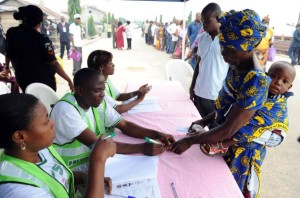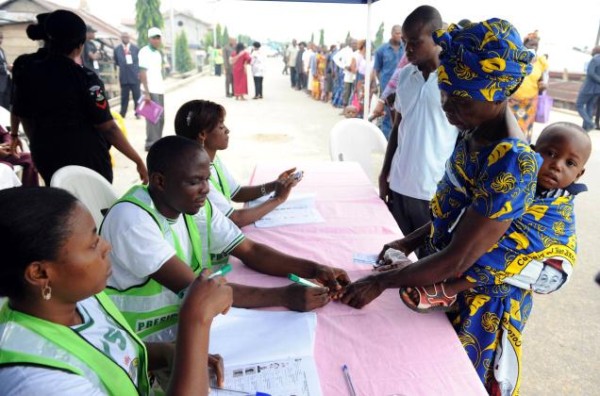 Nigeria, Africa’s most populous nation and its biggest economy, goes to the polls on Saturday to elect a new president and parliament. We spoke to Nigerian voters about their hopes, fears and political loyalties.
Nigeria, Africa’s most populous nation and its biggest economy, goes to the polls on Saturday to elect a new president and parliament. We spoke to Nigerian voters about their hopes, fears and political loyalties.
Nigerian voter Abdullahi Inuwa told our northern Nigerian correspondent he was worried.
“I feel scared, I feel unsafe, and I feel my vote that I’m going to cast might not have the desired effect,” he said.
Saturday’s election is being seen as the closest race since military rule ended in 1999. An Afrobarometer opinion poll said President Goodluck Jonathan’s People’s Democratic Party (PDP) and Muhammadu Buhari’s All Progressives Congress (APC) were neck-and-neck at 42 percent each.
The contest is being played out against the lethal rumble of the chronic Boko Haram insurgency, mostly in the north of the country, which has been offset in part by claims from the Nigerian military that they are on the verge of defeating the Islamist militants.
Stringent security measures have been introduced for the elections. Land and sea borders were shut at midnight local time on Wednesday, and there will be restrictions on movement when polling is in progress.
Past unrest
Nigeria has a history of election-related unrest and both Jonathan and Buhari appear keen to prevent a repetition of the post-election clashes in 2011 in which 1,000 people were killed.
But increased security can be a double-edged sword. Troops on the ground can be perceived as more of a threat than protection.
“Even recently, we had a court decision that the military should not be part of conducting the election, but unfortunately they insisted that they must be there,” Inuwa said.
He was referring to a ruling by Nigeria’s federal high court in Lagos on Monday (23.03.2015) which barred the military from deploying around polling stations during the election. However, the ruling, according to Justice Ibrahim Buba, who delivered it, does not apply to troops already dispatched to northeastern Nigeria to battle Boko Haram.
“This is sending us a negative signal, negative to the effect that they are planning something,” Inuwa concluded.
Fear of intimidation
Comrade Adamu Abubakar Modibbo, another northern Nigerian resident, was also concerned by the military presence.
They will intimidate the voters,” he told DW. He said he was going to vote for Buhari “because I need a change in this country.”
Buhari, 72, a former military ruler of Nigeria in the 1980s, now describes himself as a “converted democrat.” He has criticized the “insecurity, broken infrastructure and growing inequality” in Nigeria and vowed action against Boko Haram and corruption which he said had made Nigeria “the laughing stock of the world.”
Jonathan, 57, Buhari’s rival, has been campaigning for continuity and has vowed to complete the work he started in his first four years in office. “I need you to vote for me in this election, not just because of me, but so that we consolidate on the progress we have made,” he wrote in a newspaper message to Nigerians.
This struck a chord with Nigerian voter Danlami Arabs Rukuje. “Obviously I’m going to vote for President Goodluck Jonathan, for the candidates of the People’s Democratic Party. Things are being done which should obviously not be left uncompleted. Things that need to be completed to get things on track in this country,” he said.
‘My mind is prepared’
Naomi Lasara Abel, another northern Nigerian voter said she was untroubled by the six week postponement of the elections. “It has prepared us better than before. I think I’m ready to vote on Saturday.” She was also unconcerned by the government’s pre-election security clampdown. “I think I feel more comfortable if we have the presence of the military and security agencies there because of the uncertainty, you know, and the insecurity,” she said.
Hamazau Umar Usman has rather less confidence in the Nigerian authorities. “I know that in Nigeria we don’t have good governance. So I’m voting for Buhari,” he said
Other voters such as Gidado Muhammad Mabani saw taking part in the election as a matter of individual responsibility.
“It means a lot for me to choose my leader, for me to know my fate, for me to know the fate of my country. This election is very important to me personally,” he said.
Another voter, Ayube Aluke, appeared unruffled by the commotion of the past weeks and months. “I am very, very ready for Saturday’s election. I have my permanent voter card and my mind is prepared ,” he said.
In the capital Abuja, taxi driver James Godspower played down fears of unrest. “I don’t think there’s going to be violence,” he told DW correspondent Jan-Philipp Scholz.
Abuja restaurant owner Rosemary Lokosun said she didn’t think anybody wanted to create violence because everybody is aware of the implications. “Your blood is not worth anybody’s problem. It’s not worth it,” she said







